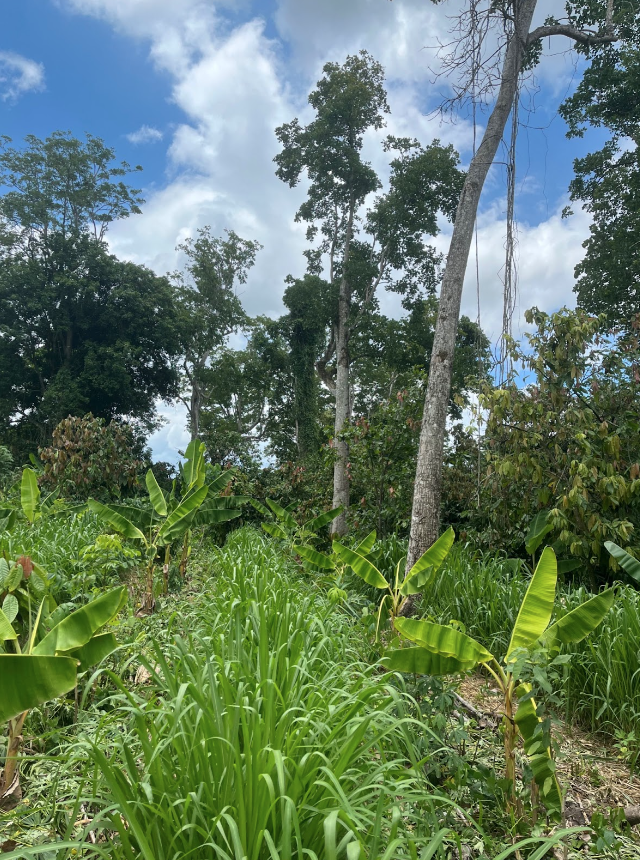After three hours of work in the fields, we were exhausted. When we finished gobbling up our mega-sized second servings of rice, beans and chicken, my friend Gabriel and I promptly took two hour long naps. Even after our siestas, we couldn’t fathom the idea of even a minute more of grueling work pruning cacao trees, chopping down plants with our machetes and yanking out invasive weeds.
Our half-day at the farm was just a glimpse into the hard work that Dominican cacao farmers – and cacao farmers all across the world – do on a daily basis. Because of its fragility, cacao is one of the most difficult crops to harvest. Plantain trees and other shade-providing fauna must be planted alongside cacao trees, or the cacao trees will wither away. But too much shade means not enough sunlight for the trees, which also results in death. As a result, farmers must closely monitor not only their cacao trees, but the many necessary plants around them.
Despite all the hard work that goes into producing cacao, cacao farmers are severely underpaid for their work. Even if farmers take the extra step to produce organic chocolate, the cacao beans they produce may only sell for 50 cents per pound to fermentation plants. Once the fermentors receive the cacao beans, they ferment the beans and sell them to transporters. These transporters ship the fermented beans overseas to refineries, typically in Europe, which process the beans into the semi finished cacao powder and butter products used to make the chocolate products we know and love. By the time the refineries are done with the cacao, the products can be sold for up to fifteen times what the farmers received for them.
This chain means that, even if you pay extra for Free Trade chocolate products, only a fraction of the money will end up in the hands of the farmers. Not only did these farmers do the majority of the work involved in the chocolate making process, but their portion of the work is the most risky. In addition to the already large risks associated with farming, where the final yield a farmer ends up with always has elements of randomness, climate change has intensified extreme weather conditions, introducing extreme heat waves and droughts that make farming even more difficult.
In recent years, the chocolate industry, particularly the organic chocolate industry, has experienced rapid growth. But for many cacao farmers, this growth is not being felt. Cacao farmers continue to live in poverty, with little to no formal education. This lack of education makes attempts to fight for higher wages nearly impossible.
The new chocolate company Inaru is working to create meaningful changes for farmers. My friend Gabriel and I interned at the Dominican-based company over the summer, where we were able to get a glimpse of how Inaru will work to fix the longstanding inequity in the chocolate industry.
Founded by two Dominican-American sisters, Janett and Erika Liriano, Inaru is able to pay the cacao farmers it partners with five times more than they traditionally make. They do this by recapturing the money lost in the supply chain as cacao travels from the farmer, to many middle men, and then to European refineries to be processed. By being involved at all steps in the chocolate making process, and refining the cacao at their refinery in the Dominican Republic, Inaru allows cacao farmers to obtain some of the much higher profits that are present in the refinement section of the cacao process. Inaru also teaches farmers how to create polyculture farms where, instead of just selling cacao, they can grow and sell cacao along with other, perhaps more profitable, crops.
Although the company was founded just a couple years ago, they plan on producing semi finished chocolate products this upcoming year. As a result, everyone was hard at work speaking with investors, obtaining certifications, meeting with farmers, creating informative social media content (check out @inarucacao on Instagram), and more.
As interns, my friend and I did and saw a little bit of everything. Interviewing farmers in the mountainous northern region of the Dominican Republic, we learned about the struggles farmers face to grow cacao and how cacao co-ops (groups of farmers who sell the beans they produce together) can help farmers. In the Nigua Free Zone in Santo Domingo, where Inaru’s warehouse is located, we helped prepare documents for Inaru to get its organic certifications. We packaged and sent cacao powder and cacao butter to Inaru’s partner, famed American chocolatier Katrina Markoff.
It was a pleasure to watch Inaru work to make change in the cacao industry. I’m excited to see how the company grows in the coming years and hopefully I will be able to return to the Dominican Republic for another summer!






